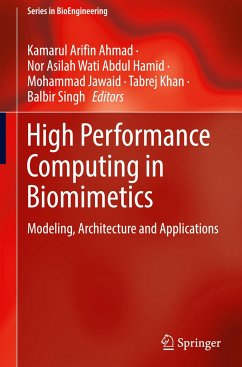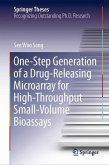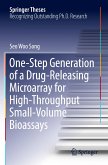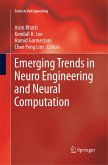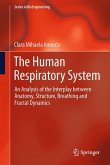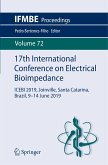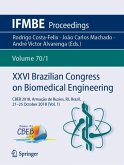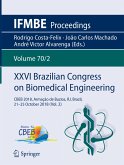High Performance Computing in Biomimetics
Modeling, Architecture and Applications
Herausgegeben:Ahmad, Kamarul Arifin; Hamid, Nor Asilah Wati Abdul; Jawaid, Mohammad; Khan, Tabrej; Singh, Balbir
High Performance Computing in Biomimetics
Modeling, Architecture and Applications
Herausgegeben:Ahmad, Kamarul Arifin; Hamid, Nor Asilah Wati Abdul; Jawaid, Mohammad; Khan, Tabrej; Singh, Balbir
- Gebundenes Buch
- Merkliste
- Auf die Merkliste
- Bewerten Bewerten
- Teilen
- Produkt teilen
- Produkterinnerung
- Produkterinnerung
This book gives a complete overview of current developments in the implementation of high performance computing (HPC) in various biomimetic technologies. The book presents various topics that are subdivided into the following parts: A) biomimetic models and mechanics; B) locomotion and computational methods; C) distributed computing and its evolution; D) distributed and parallel computing architecture; E) high performance computing and biomimetics; F) big data, management, and visualization; and G) future of high performance computing in biomimetics. This book presents diverse computational…mehr
Andere Kunden interessierten sich auch für
![One-Step Generation of a Drug-Releasing Microarray for High-Throughput Small-Volume Bioassays One-Step Generation of a Drug-Releasing Microarray for High-Throughput Small-Volume Bioassays]() Seo Woo SongOne-Step Generation of a Drug-Releasing Microarray for High-Throughput Small-Volume Bioassays75,99 €
Seo Woo SongOne-Step Generation of a Drug-Releasing Microarray for High-Throughput Small-Volume Bioassays75,99 €![One-Step Generation of a Drug-Releasing Microarray for High-Throughput Small-Volume Bioassays One-Step Generation of a Drug-Releasing Microarray for High-Throughput Small-Volume Bioassays]() Seo Woo SongOne-Step Generation of a Drug-Releasing Microarray for High-Throughput Small-Volume Bioassays75,99 €
Seo Woo SongOne-Step Generation of a Drug-Releasing Microarray for High-Throughput Small-Volume Bioassays75,99 €![Emerging Trends in Neuro Engineering and Neural Computation Emerging Trends in Neuro Engineering and Neural Computation]() Emerging Trends in Neuro Engineering and Neural Computation112,99 €
Emerging Trends in Neuro Engineering and Neural Computation112,99 €![The Human Respiratory System The Human Respiratory System]() Clara Mihaela IonescuThe Human Respiratory System119,99 €
Clara Mihaela IonescuThe Human Respiratory System119,99 €![17th International Conference on Electrical Bioimpedance 17th International Conference on Electrical Bioimpedance]() 17th International Conference on Electrical Bioimpedance112,99 €
17th International Conference on Electrical Bioimpedance112,99 €![XXVI Brazilian Congress on Biomedical Engineering XXVI Brazilian Congress on Biomedical Engineering]() XXVI Brazilian Congress on Biomedical Engineering105,99 €
XXVI Brazilian Congress on Biomedical Engineering105,99 €![XXVI Brazilian Congress on Biomedical Engineering XXVI Brazilian Congress on Biomedical Engineering]() XXVI Brazilian Congress on Biomedical Engineering113,99 €
XXVI Brazilian Congress on Biomedical Engineering113,99 €-
-
-
This book gives a complete overview of current developments in the implementation of high performance computing (HPC) in various biomimetic technologies. The book presents various topics that are subdivided into the following parts: A) biomimetic models and mechanics; B) locomotion and computational methods; C) distributed computing and its evolution; D) distributed and parallel computing architecture; E) high performance computing and biomimetics; F) big data, management, and visualization; and G) future of high performance computing in biomimetics. This book presents diverse computational technologies to model and replicate biologically inspired design for the purpose of solving complex human problems. The content of this book is presented in a simple and lucid style which can also be used by professionals, non-professionals, scientists, and students who are interested in the research area of high performance computing applications in the development of biomimetics technologies.
Produktdetails
- Produktdetails
- Series in BioEngineering
- Verlag: Springer / Springer Nature Singapore / Springer, Berlin
- Artikelnr. des Verlages: 978-981-97-1016-4
- 2024
- Seitenzahl: 316
- Erscheinungstermin: 21. März 2024
- Englisch
- Abmessung: 241mm x 160mm x 23mm
- Gewicht: 584g
- ISBN-13: 9789819710164
- ISBN-10: 9819710162
- Artikelnr.: 69872601
- Herstellerkennzeichnung
- Springer-Verlag GmbH
- Tiergartenstr. 17
- 69121 Heidelberg
- ProductSafety@springernature.com
- Series in BioEngineering
- Verlag: Springer / Springer Nature Singapore / Springer, Berlin
- Artikelnr. des Verlages: 978-981-97-1016-4
- 2024
- Seitenzahl: 316
- Erscheinungstermin: 21. März 2024
- Englisch
- Abmessung: 241mm x 160mm x 23mm
- Gewicht: 584g
- ISBN-13: 9789819710164
- ISBN-10: 9819710162
- Artikelnr.: 69872601
- Herstellerkennzeichnung
- Springer-Verlag GmbH
- Tiergartenstr. 17
- 69121 Heidelberg
- ProductSafety@springernature.com
Prof. Ir. Dr. Hj. Kamarul Arifin Ahmad is currently Director of the Putra Science Park UPM and Professor in Aerospace Engineering Department in UPM. He has bachelor degree from Universiti Sains Malaysia, M.Sc. in Aerodynamics (Aerospace Dynamics) from Cranfield University, and Doctorate from Queens University of Belfast. In 2015, he obtained his Professional Engineer (PE) status from Board of Engineers Malaysia (BEM). Between 2016 and 2018, he was seconded to King Saud University, Saudi Arabia, in the Department of Mechanical Engineering. He is also Former Head of the Aerospace Malaysia Research Centre (AMRC) UPM and Head of the Aerospace Engineering Department in UPM. He has vast experiences in the Aerospace Engineering field and has been teaching in the same area for more than 15 years. He also taught aerospace engineering related subjects namely introduction to aerospace engineering, aerodynamics, gas dynamics, and computational fluid dynamics. Dr. Nor Asilah WatiAbdul Hamid is currently Lab Head of Laboratory of Computational Sciences and Mathematical Physics, Institute for Mathematical Research, Universiti Putra Malaysia, where she is also Associate Professor in the Department of Communication Technology and Network, Faculty of Computer Science and Information Technology. She has received her Ph.D. in Computer Science from University of Adelaide in 2008. She has been Visiting Scholar with the High Performance Computing Lab, the George Washington University, USA, from 2013 until 2015. She is Receiver of the CUDA Teaching Centre award from NVIDIA in 2015 and established the CUDA lab in her faculty. She has authored or co-authored more than 80 journals and conference proceedings in her area, and her work was funded by government and some by industry. Her research interests are in parallel and distributed high performance computing, cloud computing and data intensive computing. Dr. Mohammad Jawaid is currently working as Senior Fellow (Professor) at Biocomposite Technology Laboratory, Institute of Tropical Forestry and Forest Products (INTROP), Universiti Putra Malaysia, Serdang, Selangor, Malaysia, and also Distinguished Visiting Professor at Malaysian Japan International Institute of Technology (MJIIT), Malaysia. He received his Ph.D. from Universiti Sains Malaysia, Malaysia. He has more than 20 years of experience in teaching, research, and industries. His area of research interests includes hybrid reinforced/filled polymer composites and advanced materials. So far, he has published 65 books, 80 book chapters, more than 450 peer-reviewed international journal papers and several published review papers under top 25 hot articles in science direct during 2013-2018.He is also International Advisory Board member of Springer Series on Polymer and Composite Materials. He is Reviewer of several high impact ISI journals (200 journals). He is also Fellow and Chartered Scientist of IOM, UK. Dr. Tabrej Khan is amaterial scientist with Ph.D. in Aerospace Engineering (Specialization in materials) from University Putra Malaysia in 2020. He is currently working as a postdoctoral fellow in the field of material science and engineering at Department of Engineering Management, College of Engineering Prince Sultan University, Riyadh, Saudi Arabia. He has a pool of good publications in reputed journals, patents, chapters in books and has lot of experience in the field of Hybrid Composites, Advanced Materials, Structural Health Monitoring and Impact Studies, Damage Detections and Repairs, Impact Studies, Signal Processing and Instrumentations, Non-destructive Testing, and Destructive Testing. Dr. Balbir Singh is currently working as a senior assistant professor in Aerospace Engineering at the Department of Aeronautical and Automobile Engineering, Manipal Institute of Technology, Manipal Academy of Higher Education, India. He has a doctoral degree in the field of Aerospace Engineering from Department of Aerospace Engineering, Faculty of Engineering. Universiti Putra Malaysia. He has good number of publications and grants in his favour. His research focuses on insect inspired miniaturized robots for planetary studies, advanced aerospace materials (bio, natural, or nano) at all the scales, high performance computing and modelling, unsteady aerodynamics, space debris removal and traffic management, space systems engineering, and clean energy.
Introduction to biomimetics, modeling, and analysis.- High Performance Computing and its application in computational biomimetics.- Bio-inspired computing and associated algorithms.- Cloud computing infrastructure, platforms, and software for scientific research.- Expansion of AI and ML breakthroughs in research with shift to edge computing in remote environments.- Role of distributed computing in biology research field and its challenges.- HPC based high-speed networks, ARM Processor architecture and their configurations.- High-Performance Computing based operating systems, software dependencies and IoT Integration.- GPU and ASIC as boost for HPC in biomimetics.- Biomimetic modeling and analysis using modern architecture frameworks like CUDA.- Unsteady flow topology around an insect-inspired flapping wing pico aerial vehicle.- Machine Learning based Dynamic Mode Decomposition of vector flow field around mosquito-inspired flapping wing.- Application of Cuckoo Search Algorithm in bio-inspired computing using HPC platform.- Application of Machine Learning and Deep Learning in High Performance Computing.- The future of high performance computing and some challenges - Editor's Summary.
Introduction to biomimetics, modeling, and analysis.- High Performance Computing and its application in computational biomimetics.- Bio-inspired computing and associated algorithms.- Cloud computing infrastructure, platforms, and software for scientific research.- Expansion of AI and ML breakthroughs in research with shift to edge computing in remote environments.- Role of distributed computing in biology research field and its challenges.- HPC based high-speed networks, ARM Processor architecture and their configurations.- High-Performance Computing based operating systems, software dependencies and IoT Integration.- GPU and ASIC as boost for HPC in biomimetics.- Biomimetic modeling and analysis using modern architecture frameworks like CUDA.- Unsteady flow topology around an insect-inspired flapping wing pico aerial vehicle.- Machine Learning based Dynamic Mode Decomposition of vector flow field around mosquito-inspired flapping wing.- Application of Cuckoo Search Algorithm in bio-inspired computing using HPC platform.- Application of Machine Learning and Deep Learning in High Performance Computing.- The future of high performance computing and some challenges - Editor's Summary.

